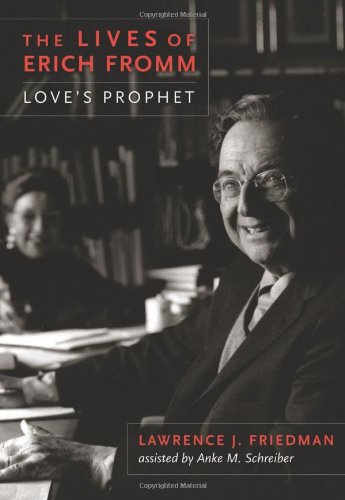Ny bok
The Lives of Erich Fromm: Love’s Prophet av Lawrence J. Friedman (2013)
Lawrence J. Friedman er professor ved Harvard University. Han ble kåret til International Writer of the Year for 2003 av International Biographical Center. Han har skrevet en rekke bøker og artikler, bl.a. Identity’s Architect: A Biography of Erik Erikson. Biografien om Erich Fromm har fått svært god omtale.
Erich Fromm (1900-1980) var psykoanalytiker og en av pionerene innen interpersonlig psykoanalyse og en av grunnleggerne av William Alanson White Institute of Psychiatry, Psychoanalysis & Psychology, som Institutt for Psykoterapi har hatt, og har, et nært forhold til. Fromm har skrevet en rekke bøker som har blitt bestselgere: The Art of Loving, Escape from Freedom, The Sane Society, To Have or to Be? The Nature of the Psyche, The Revolution of Hope: Toward a Humanized Technology. Bøkene er solgt i flere millioner eksemplarer, og The Art of Loving er alene solgt i over 25 millioner eksemplarer.
Erich Fromm var også en politisk aktivist og filosof, og en av de viktigste intellektuelle i det tjuende århundre . Han var bl.a. en av grunnleggerne av Amnesty International og grunnlegger av National Committee for a Sane Nuclear Policy.
I boken forteller Friedman at hans første møte med Erich Fromm var i 1958, like før han, 18 år gammel, skulle dra hjemmefra for å begynne å studere. Han og bestefaren pleide å se et TV-program sammen, The Mike Wallace Show. Wallace hadde et timelangt intervju med Erich Fromm, der han introduserte ham som en mann med «to liv» – den viktigste psykoanalytiker siden Freud, og en forkjemper for fredelig sameksistens med russerne. Friedman skriver at Fromm i løpet av intervjuet «..tastefully expanded on Wallace’s descriptions of his two apparent lives, defining himself, first, as a psychoanalytically informed clinician; second, as a political activist; third, as a social critic; and, fourth, as a writer committed to instructing society. Fromm underscored that these roles were neither exclusionary nor disparate but tied together by his vision of himself as a prophet for the love of life in the face of man’s seeming inability to move beyond hatreds, violence, and war.”
Om forholdet mellom Fromm og Freud skriver Friedman at han oppfatter Fromms «..conceptual sparring with Freud not so much as a rebellious rejection of Freud’s psychoanalytic formulations but as a free-ranging dance of civility in the life of the mind and spirit of two cultivated Europeans uprooted by Hitler’s crude and violent authoritarianism. Each had been forced to leave his homeland and to redefine the varied roles and requirements of everyday existence abroad. Moreover, both had searched in similar and in different ways to understand broadly the razor’s edge that can separate the proprieties of civil society from barbarism and mass murder. In some sense, Freud’s Civilization and Its Discontents and Fromm’s Escape from Freedom were representations of that conceptual and spiritual search. It was a dance of mind and emotion involving two practicing psychoanalysts, each seeking in his own ways and specific circumstances to explain the destructive currents of the twentieth century. Fromm concluded that love was the antidote. Freud was less hopeful.”
The Mike Wallace Interview: Erich Fromm (1958-05-25)
